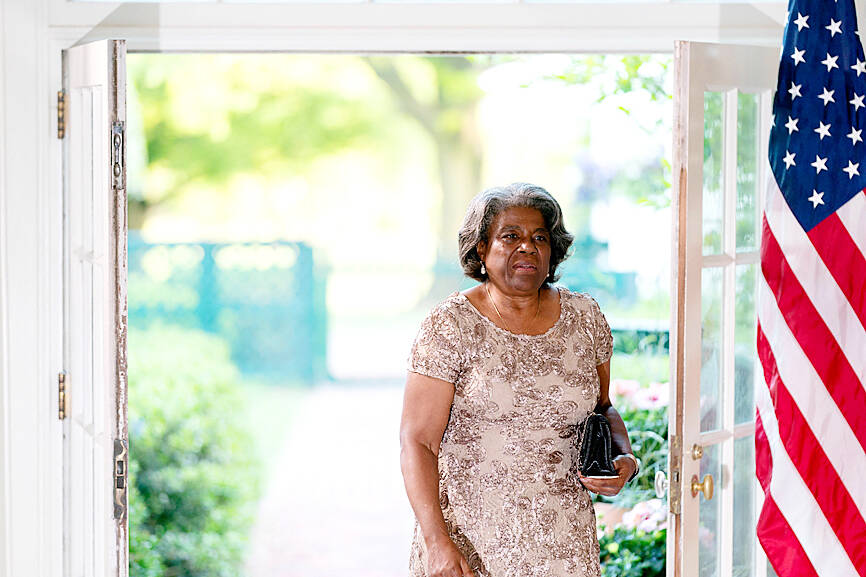US Ambassador to the UN Linda Thomas-Greenfield is scheduled to visit Brazil next week, following up on recent high-level meetings between the presidents and top diplomats of the two countries, the US Mission to the UN said on Wednesday.
Thomas-Greenfield plans to visit the capital, Brasilia, and then travel to Salvador, one of the oldest cities in the Americas and a center of Afro-Brazilian culture, from Tuesday to Thursday, the mission said.
Her visit follows Brazilian President Luiz Inacio Lula da Silva meeting with US President Joe Biden in Washington in February, in which he stressed the importance of defending democracy and preserving the Amazon rain forest.

Photo: AFP
The trip also occurs on the heels of talks at the G20 ministerial meeting in New Delhi in March between US Secretary of State Antony Blinken and Brazilian Minister of Foreign Affairs Mauro Vieira.
Lula has also reached out to China and Russia, having traveled to Beijing earlier this month to meet with Chinese President Xi Jinping (習近平) in Beijing, and holding talks with Russian Minister of Foreign Affairs Sergey Lavrov in Brasilia last week.
The US mission said Thomas-Greenfield, a member of Biden’s Cabinet, plans to focus on promoting multilateral cooperation on the trip, as well as on combating climate change, safeguarding food security, continuing cooperation on regional migration, “and ensuring equity for marginalized racial, ethnic and Indigenous communities.”
Brazil, Latin America’s largest country and a major global exporter, is serving a two-year term on the UN Security Council.
The mission said that in Brasilia, the ambassador is scheduled to meet with government officials “to discuss our partnership in the region and at the United Nations.”
She is also to meet Brazilian communities dealing with the more than 250,000 Venezuelan migrants, refugees and asylum seekers, and speak at the University of Brasilia, the mission said.
In Salvador, Thomas-Greenfield is scheduled to discuss the US’ commitment to reinvigorate the 2008 US-Brazil Joint Action Plan to Eliminate Racial and Ethnic Discrimination and Promote Equality, and engage with Afro-Brazilian civil society and young people, it said.

Thousands gathered across New Zealand yesterday to celebrate the signing of the country’s founding document and some called for an end to government policies that critics say erode the rights promised to the indigenous Maori population. As the sun rose on the dawn service at Waitangi where the Treaty of Waitangi was first signed between the British Crown and Maori chiefs in 1840, some community leaders called on the government to honor promises made 185 years ago. The call was repeated at peaceful rallies that drew several hundred people later in the day. “This government is attacking tangata whenua [indigenous people] on all

RIGHTS FEARS: A protester said Beijing would use the embassy to catch and send Hong Kongers to China, while a lawmaker said Chinese agents had threatened Britons Hundreds of demonstrators on Saturday protested at a site earmarked for Beijing’s controversial new embassy in London over human rights and security concerns. The new embassy — if approved by the British government — would be the “biggest Chinese embassy in Europe,” one lawmaker said earlier. Protester Iona Boswell, a 40-year-old social worker, said there was “no need for a mega embassy here” and that she believed it would be used to facilitate the “harassment of dissidents.” China has for several years been trying to relocate its embassy, currently in the British capital’s upmarket Marylebone district, to the sprawling historic site in the

A deluge of disinformation about a virus called hMPV is stoking anti-China sentiment across Asia and spurring unfounded concerns of renewed lockdowns, despite experts dismissing comparisons with the COVID-19 pandemic five years ago. Agence France-Presse’s fact-checkers have debunked a slew of social media posts about the usually non-fatal respiratory disease human metapneumovirus after cases rose in China. Many of these posts claimed that people were dying and that a national emergency had been declared. Garnering tens of thousands of views, some posts recycled old footage from China’s draconian lockdowns during the COVID-19 pandemic, which originated in the country in late

‘IMPOSSIBLE’: The authors of the study, which was published in an environment journal, said that the findings appeared grim, but that honesty is necessary for change Holding long-term global warming to 2°C — the fallback target of the Paris climate accord — is now “impossible,” according to a new analysis published by leading scientists. Led by renowned climatologist James Hansen, the paper appears in the journal Environment: Science and Policy for Sustainable Development and concludes that Earth’s climate is more sensitive to rising greenhouse gas emissions than previously thought. Compounding the crisis, Hansen and colleagues argued, is a recent decline in sunlight-blocking aerosol pollution from the shipping industry, which had been mitigating some of the warming. An ambitious climate change scenario outlined by the UN’s climate